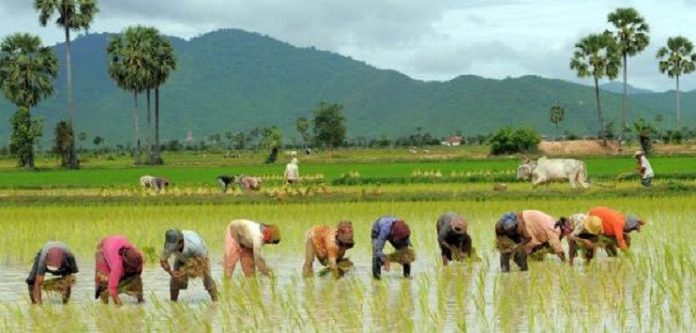The Minister of State for Agriculture and farmers welfare Shri Gajendra Singh Shekhawat in a written reply to the question on development of new farm technologies in Lok Sabha stated that the Indian Council of Agricultural Research (ICAR) has overall 102 institutions comprising of 67 Research Institutes, 6 Bureaux, 14 Directorates and 15 National Research Centres mandated for conducting research in agriculture and allied areas besides 11 Agricultural Technology Application and Research Institutes (ATARIs) and 81 AICRPs/Network Projects mandated for coordinating, refining and demonstrating Agricultural Technologies/ innovation in the country. ICAR is giving focused attention towards development, promotion and propagation of new technologies i.e. high yielding and multi-stress resistant/tolerant varieties/hybrids using conventional and genomic tools in major crops; multi-nutrients rich varieties of rice, wheat, maize, lentil and pearl millet and improved quality of mustard and soybean; blast resistant wheat varieties; transgenic varieties in cotton, pigeonpea and chickpea; exploitation of gene editing technology for improving desired traits in rice and wheat and development of extra-early/early maturing varieties of pulses especially mungbean and pigeonpea.
The technologies developed in farm sector across the country during the last three years and the current year are:-
The research efforts of the Institutes/Centres/AICRPs have led to the development and release of 748 high yielding, stresses (biotic & abiotic) tolerant varieties/hybrids in different field crops for cultivation under different agro-climatic conditions during 2014-2017. Besides, 130 improved varieties of 54 important horticultural crops and 105 improved crop management technologies and package of practices for horticultural crops were also developed. More than 3.50 lakh quintals of breeder seeds of improved varieties of field crops and 18.5 lakh grafted plants, 12 lakh rooted cuttings and tuber crops, 90 tonnes of breeder/truthfully labelled seeds of vegetable crops, 5500 tonnes of breeders seed of potato and tropical tuber crops were produced and distributed during the period (2014-2017) for sustaining the effective seed chain in the states. These varieties and improved management practices have contributed significantly in increasing the production in field crops e.g. the production of total food grain increased from 252.02 million tons in 2014-15 to 275.68 million tons in 2016-17. The vegetable production increased from 166.6 million tonnes in 2014-15 to 176.2 million tonnes in 2016-2017. Similarly fruits production increased from 89.5 million tonnes in 2014-15 to 93.7 million tonnes in 2016-2017.
During the last 3.5 years ICAR developed 13 improved poultry, pig and sheep varieties and released (4 backyard poultry: Kamrupa in Assam, Narmadanidhi in MP, Jharsim in Chhattisgarh and Himsamridhi in HP; 8 pig varieties: HD-K75, Rani and Asha in Assam; Jharsuk in Jharkhand; Mannuthy White in Kerala; Lumsniang in Meghalaya; TANUVAS KTM Gold Crossbred Pig (Large White Yorkshire x Desi) in Tamil Nadu and “SVVU-T 17 Crossbred Pig”, (Large White Yorkshire x Desi) in Telangana and Avishan breed of Sheep suitable for rearing in dry zones of the country.
Developed 36 diagnostics and 9 vaccines / vaccine candidates for prevention and control of diseases (Diagnostics: JE, Brucellosis, FMD, Theileriosis, Listeriosis, Avian Influenza, E. coli in neo-natal kids, type-specific ELISA kit for differentiation of EHV1 & amp; 4 Infection, Equine piroplasmosis, Sandwich ELISA for PPR antigen with high sensitivity (95.34 to 96.81%), for detection of 1- 10 5 ppt AFM1 in milk, etc. Vaccines: PPR, Sheep pox, Equiherpabort, Updated equine influenza vaccine, Classical swine fever and Johne’s disease etc.). In addition, more than 145 new animal husbandry technologies were also developed by ICAR during the last 3.5 years.
In the area of fisheries, ICAR developed breeding and seed production technology of 9 food fish species (Cobia, Milkfish, Seabass, Silver pompano, Orange spotted grouper, Pink ear emperor, Long whiskers catfish, Chocolate mahseer, Pangusia labeo, Putia, Chaguni puti, and Mahanadi rita); the technology of marine cage farming and its dissemination through 1500 cages (principally in Gujrat, Maharashtra, Karnataka, Kerala, TN and AP); 4 feeds for different life stages of important fish and shrimp species and their commercialization, breeding and seed production technology for 9 ornamental fishes and 5 high-value compounds and nutraceuticals for human health (Green mussel extract – CadalminTM GMe for pain & arthritis; Green algal extract – Cadalmin TM GAe for pain & arthritis; Seaweed antidiabetic extract – CadalminTM Ade for type-2 diabetes; Seaweed anti-obesity extract – CadalminTM Ace to combat obesity/dyslipidemia and Seaweed nutraceutical drink – Nutridrink’ for enhancing micronutrients).
To increase productivity, reduce cost of cultivation, reduce drudgery, improve value addition, conserve resources and provide alternate means for energy generation through improve farm mechanisation during the last 3 years, ICAR developed 72 new farm equipment/machines/gadgets and 34 new products/ process protocols and supplied over 16500 prototypes of agricultural machinery to farmers/ entrepreneurs. ICAR trained 710 rural youth for establishing Custom Hiring Centres in different parts of the country out of which 652 entrepreneurs established Custom Hiring Centres. ICAR equipped 194 startup companies and agri-entrepreneurs by providing necessary training and skills to start their new agri-ventures.
ICAR has developed and validated 623 district contingency plans and conducted skill development programs for 40.9 lakh farmers. Mridaprarikshak a minilab for soil analysis developed to support Government’s initiative of Soil Health Card. ICAR has also developed 45 Integrated Farming Systems (IFS) models in 23 states and 1 Union Territory covering all the 15 agro-climatic regions of the country. These models were tested and further validated in the fields of 1250 farmers each under various different agro ecologies covering 23 states of the country.
On the question of whether the Government has developed any mechanism to disseminate information about such innovation/technologies to the farmers, Shri Shekhawat informed that for delivering such benefits, the ICAR has established a network of 690 Krishi Vigyan Kendras (KVKs) in the country, mandated for conducting front line demonstration at the farmer’s field, technology refinement, training and capacity building. The technologies duly tested and refined are thereafter passed on to line departments for large scale demonstration and transfer among farmers.
Highlighting the salient features of the Kisan portal and its advantages to the farmers, Shri Singh informed that in mKishan, around 2.75 crore farmers are registered who are continuously receiving crop specific advisories in their local language on their mobile sets. No internet is required for receiving such advisories. Experts from ICAR, IMD, and State Government down to the block level send crop specific advisories to registered farmers. Apart from mKishan, Kishan Suvidha mobile App has been developed for use of the farmers having smart phones and access to internet. Information about Agro advisory, weather, market price, plant protection etc. are provided to farmers with the click of a button.





































